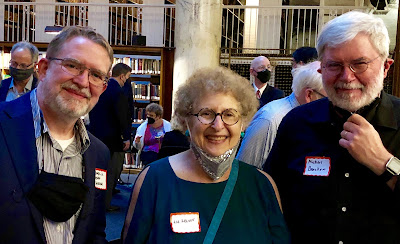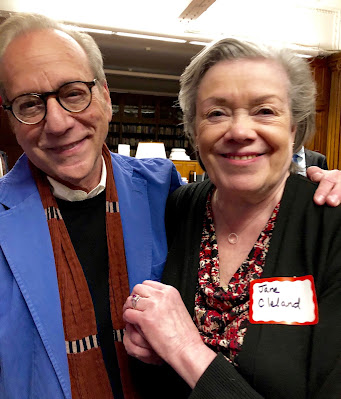Things many people find difficult to do:
- Lose weight
- Follow directions
- Not give unsolicited advice on Facebook
You can count me among "many people" when it comes to the first item. But with the other two, I know about their prevalence because I have been a victim of them.
A victim, I say!
Yes, yes, I occasionally give unsolicited advice, but it's always with hesitation. An explanation for why I'm wading in. An apology even. Other people, I've found, don't have such qualms.
An example (one of many): About two years ago, in the height of 2020 pandemic madness, I posted on Facebook that I had a lot of broccoli in my house but the dressing I'd gotten in my last grocery pickup didn't taste good. I mentioned the three other condiments I had at home (salsa, ketchup, and butter) and asked my friends if any of them would work with broccoli, as I had my doubts. (I hadn't thought of melting the butter--once that option was pointed out, it was a doh moment.) At any rate, I also made clear that I don't cook and had no other ingredients in the house, so I requested that my friends not make alternate suggestions of condiments to use or ways to cook the broccoli. I thought I was pretty clear.
Then the following happened. The conversation has been greatly condensed since I received more than 300 responses. Names have been removed to protect the guilty.
Friend A
Roast it in the oven with olive oil and sprinkle some Parmesan cheese on top. It’s not hard. Or steam it and top with butter and a squeeze of lemon juice.
Me
Don't have olive oil, cheese, or lemon.
Friend A
Ok—just steam and add butter. Do you have Italian dressing. You could use that as an olive oil substitute.
Me
Nope, I don't.
As you can see, I was calm at this point, merely reminding Friend A that I didn't have some of the items she suggested I use.
Friend B
A nice, sweet balsamic vinegar. I like white balsamic.
Me
I don't have vinegar (and I don't like it either). More for you!
See how pleasant I was? This was early going.
Friend C
I roast broccoli with garlic and chopped up bacon.
Me
I have no garlic and I don't like bacon.
Friend D
Saute in some olive oil with garlic. Squeeze on some lemon before eating if you have some. Delicious. Or roast tossed in olive oil with a little garlic salt or sea salt or Goya adobo seasoning.
Me
I don't have any olive oil or garlic. Or lemon. Or sea salt or adobo seasoning. And sauteing and roasting means cooking. I don't cook.
Friend E
Add it to something you like ... or, as others have said, butter is good, and I'd add some seasoned salt. I like sprinkling blends from Penzeys Spices on various foods. Their Salad Elegant would be great on broccoli.
Me
I don't have seasoned salt. I wasn't kidding about the only possible toppings I have in the house. Butter, salsa, and ketchup.
Friend F
The extent to which people cannot comprehend the state of your pantry is deeply hilarious to me.
Me
I am less amused.
Friend F
Would definitely think twice about hiring your fb friends for a job that requires ability to follow instructions.
She (Friend F) wasn't kidding. But I steeled myself and kept reading the responses.
Friend G
I would boil some water, add a ton of salt, and blanch the broccoli for like 2-3 minutes. Then drain and chill.
Me
Blanch?
Friend G
Extremely easy. [Lists a link for how to blanch.]
Note to the reader: Not extremely easy.
Friend H
Really tasty: sliced zucchini or yellow squash, plus a red sweet pepper, sauteed in olive oil or butter with garlic and sweet red onion or green spring onions. Add a little basil for punch, but it isn't required.
Me[Mouth hanging open.]
At this point, I stopped responding to almost all the comments, most of which were suggestions of other things I should cook using food I didn't have in the house. Me. The person who doesn't cook and who certainly would not be going to the market for the suggested foods. (Add one picky eater who doesn't cook and the height of the pandemic and you got hell no.)
Occasionally, though, I became so incensed, I did respond.
Friend I
Saute in a pan, with ginger, olive oil and garlic, 1 T corn starch, and 1/4 cup of water.
Me
I DON'T COOK!
Friend G
This post has turned absurd, and I love it.
Me
That makes one of us
Friend J
Two of us! Sorry, Barb.
Me
It's like people are trying to give me a stroke at this point.
Can you feel the stress? It's two years later, and reading all these comments is aggravating me all over again.
You may be wondering why I'm sharing all of this with you, other than for your amusement. It's because of something I often say: Everything is fodder. If you're looking for a story idea, mining current events or events in your own life is often a good place to start. I took this condiment conversation and my associated aggravation and put it to good use when the fine folks at Malice Domestic put out a call for short stories for their anthology titled Malice Domestic 16: Mystery Most Diabolical.
What if, I thought, a low-earning spendthrift without any morals is the only living relative of a rich elderly woman. He decides to friend her on Facebook, aiming to drive her crazy with unsolicited advice so she'll have a heart attack and die and he can inherit all her money. That sounded pretty diabolical to me.
Five thousand words later, the idea became my newest short story, "Go Big or Go Home," which is the lead story in Mystery Most Diabolical. The book was released about ten days ago. I had a lot of fun writing the story. I hope readers will enjoy it just as much. And yes, it has Facebook conversations just like the one above.
Mystery Most Diabolical is out in trade paperback and hardcover. (Click here to buy from Amazon. Or, to buy directly from the publisher, click here (for paperback) or here (for hardback).) The ebook doesn't seem to be for sale yet, but I'm sure it's coming soon. The anthology has 32 stories, including one from fellow SleuthSayer Michael Bracken. I welcome the other authors in the book to share what their diabolical stories are about in the comments.
But before that ...
Congratulations to fellow SleuthSayer R.T. Lawton for winning the Edgar Award last week! And congratulations to Michael Bracken for winning the Derringer Award a few days ago!
And, for those of you in the Dallas, Texas, area, here's an event worth your time. Next Wednesday, May 11th, the Sisters in Crime North Dallas chapter will be hosting an in-person event for its recent inaugural anthology, Malice in Dallas: Metroplex Mysteries Volume 1! Books will be available for purchase, and authors with stories in the book will be on hand to sign copies. There also will be a scavenger hunt, drawings for prizes, and more! (What's the "more"? You have to go to find out!) The festivities will be at the J. Theodore Restaurant & Bar in Frisco, Texas, starting at 4:30 p.m. Central Time. Click here to learn more about the event and to RSVP.
Why am I telling you about Malice in Dallas? Because I had the pleasure of editing it. It has ten crime stories, including one by fellow SleuthSayer Mark Thielman. The tales will bring you to various locations throughout the Dallas/Fort Worth area, including Little Mexico, Lake Ray Hubbard, the downtown Dallas pedestrian tunnels, and Dealey Plaza, where President Kennedy was shot. We've got historicals, police procedurals, and amateur-sleuth mysteries. Some of the stories are humorous. Others are dark. All, I hope you'll agree, are good. If you can't make it to the event, you can still buy the book by clicking here.










































.jpg)








